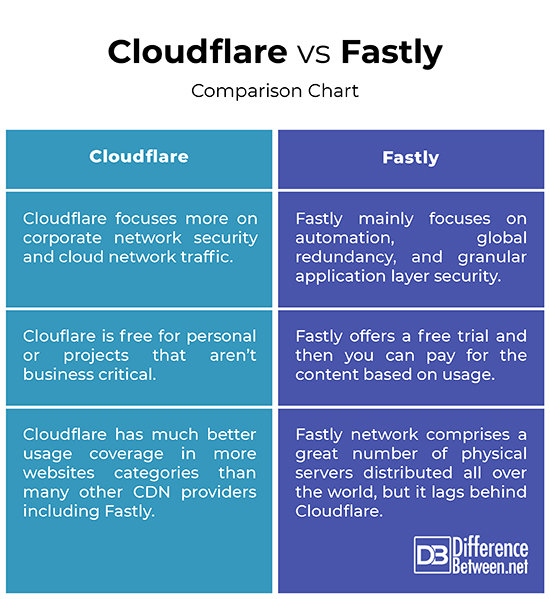Difference Between Fastly and Cloudflare
Fastly and Cloudflare are two of the most popular and among the fastest growing content delivery network (CDN) providers out there.
Both manage a global network of interconnected servers that work together to provide fast delivery of internet content.
Both provide best-in-class services and support. But, if pitted head-to-head which company would come out on top as a better CDN provider? Let’s take a look.

What is Cloudflare?
Founded in 2009, Cloudflare is a global network of servers designed to make websites fast, secure, private, and more reliable. It makes your internet safer by protecting any internet application online without even adding hardware or installing software.
Cloudflare is a free service that protects and accelerates any website online. Once a website is part of the Cloudflare network, their website is routed through Cloudflare’s intelligent global network. This way the delivery of web pages is optimized automatically and so, users get faster load times.
Cloudflare is one of the most popular CDNs in the world that hosts more than 2 million websites. What it does is it creates cached copies of websites it hosts in its global network of servers. It then delivers content to the users.

What is Fastly?
Fastly is a popular and feature-rich CDN that offers competitive pricing as a well as a good coverage of hardware infrastructure worldwide. Fastly is a relatively small company that was founded in 2011. Now more than a decade later, Fastly is one of the fastest growing CDN providers offering a range of services including cloud security, streaming media delivery, and load balancing services.
Fastly, as the name suggests, focuses heavily on faster page load times. In regard to page speed optimization, Fastly is a great alternative to the likes of Cloudflare or StackPath. The company was founded by Artur Bergman, who had a long history of doing open-source development and various large websites.
Fastly is best known for being a real time CDN which means everything happens in real time, making it easy to deliver uncacheable content efficiently.
Difference between Fastly and Cloudflare
In terms of Pricing between Fastly vs. Cloudflare
– Fastly is a pay-as-you-use service that charges its customers a minimum of $50 per month based on the combined total of bandwidth and request usage. It offers a free trial and then you can pay for the content and streaming delivery based on usage.
Cloudflare, on the other hand, is free for personal or projects that aren’t business critical. The free plan is a useful tool for nay websites, particularly the smaller websites that do not attract a lot of traffic. Their customers can use free DNS services regardless of their plan. So, Cloudflare is a clear winner of this category.
API Capability of Fastly vs. Cloudflare
– Fastly’s products are fully programmable and support nearly every custom API to ensure smooth integration and granular control over how the websites’ content are cached.
Cloudflare also takes a API-first approach. Cloudflare’s Cache API unleashes a huge amount of power. For instance, Workers gives the ability to modify Request and Response objects, allowing you to control any caching behavior. Also, the Cache API can be used as a general purpose, ephemeral key value store.
Coverage of Fastly vs. Cloudflare
– Cloudflare has built a strong network of highways across the internet to deliver a better and faster internet experience to websites, applications, and corporate networks across the globe. Even some of the top ecommerce companies use Cloudflare, companies such as Etsy, Walmart, Canva, Best Buy, and more.
Cloudflare also has much better usage coverage in more websites categories than many other CDN providers out there. Although Fastly is one of the leading CDN providers, it lags behind Cloudflare in terms of coverage. So, this round goes to Cloudflare.
Cloudflare vs. Fastly: Comparison Chart

Summary of Fastly vs. Cloudflare
Both Cloudflare and Fastly are the two of the leading and modern content delivery network providers out there that operate as a reverse proxy. However, Fastly is purely a CDN with a global network of severs distributed all over the world.
Fastly focuses on delivering video and everything you need from a modern CDN. Cloudflare is one of the largest DNS providers in the world which prides itself on being the fastest across popular networks. It mainly focuses on corporate network security.
Frequently asked questions
Is Fastly better than Cloudflare?
Both Fastly and Cloudflare are among the fastest growing content delivery network (CDN) providers. Fastly is basically an edge cloud platform that accelerates your web and mobile applications while making content delivery faster. Cloudflare is a web performance and security company that hosts more than 2 million websites. Cloudly is larger than Fastly.
What is better than Cloudflare?
There are some good alternatives to Cloudflare CDN, like Google Cloud CDN, Microsoft Azure CDN, Akamai CDN, CloudFront CDN, etc.
Is Fastly a good CDN?
Fastly is purely a CDN with a global network of severs distributed all over the world. In addition, Fastly is one of the leading CDN providers out there, and is a fast and reliable CDN.
Who competes with Cloudflare?
Some of Cloudflare competitors are Akamai Technologies, Amazon CloudFront, Google Public DNS, Limelight Networks, and more.
- Difference Between Caucus and Primary - June 18, 2024
- Difference Between PPO and POS - May 30, 2024
- Difference Between RFID and NFC - May 28, 2024
Search DifferenceBetween.net :
Leave a Response
References :
[0]Uzayr, Sufyan bin. Web Performance Optimization: A Practical Approach. Florida, United States: CRC Press, 2022 Print
[1]Woodbeck, Adam. Network Programming with Go: Code Secure and Reliable Network Services from Scratch. California, United States: No Starch Press, 2021. Print
[2]Suzor, Nicolas P. Lawless: The Secret Rules That Govern Our Digital Lives. Cambridge, United Kingdom: Cambridge University Press, 2019. Print
